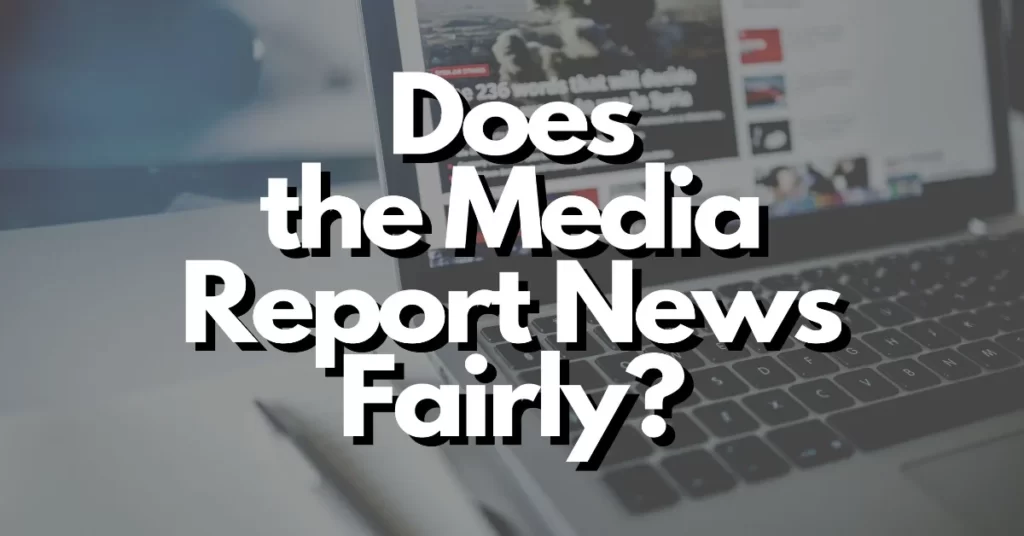In today’s information age, the role of media in shaping public perception and disseminating news has become a topic of intense debate. One critical aspect of media coverage is the question of fairness in news reporting. With the proliferation of various news outlets and the prevalence of bias in reporting, many people question whether the media indeed reports news fairly.
In this blog post, we will explore the concept of media fairness, examine different perspectives on this issue, and discuss the challenges and implications of fair news reporting in today’s media landscape.
Evaluating News Objectivity and Impartiality
News objectivity and impartiality are fundamental principles in journalism, but evaluating them can be complex. Objectivity refers to the presentation of facts without bias, while impartiality implies fairness and neutrality in reporting.
However, achieving complete objectivity and impartiality can be challenging, as journalists are also influenced by their own perspectives and societal factors. When evaluating news for objectivity and impartiality, readers should consider multiple sources to get a well-rounded view of an issue.
It’s important to look for evidence-based reporting, diverse perspectives, and verification of facts from reliable sources. Checking for potential biases, both explicit and implicit, is also crucial in evaluating news objectively.
Influences on News Reporting: Ownership, Funding, and Political Factors
News reporting can be influenced by various factors, including ownership, funding, and political considerations. Media ownership can impact news coverage, as different media outlets may have different ownership structures and agendas. Corporate ownership or political affiliations of media organizations can affect the selection, framing, and presentation of news stories.
Funding sources, such as advertisers or sponsors, can also impact news reporting, as they may influence the content or tone of news coverage. Political factors, including government regulations, censorship, and political pressure, can also shape news reporting.
It’s important for readers to be aware of these influences and consider them when evaluating news coverage to understand the potential biases and perspectives involved.
Media Bias and Its Impact on News Reporting
Media bias refers to the presence of a particular perspective or slant in news coverage that may influence the audience’s perception of an issue. Bias can manifest in various forms, such as selection bias, framing bias, or partisan bias, and it can impact the accuracy, fairness, and balance of news reporting.
Media bias can be unintentional, stemming from journalists’ personal beliefs or societal factors, or it can be intentional, reflecting a media outlet’s editorial stance. It’s important for readers to be critical of media bias and seek out diverse sources to gain a more comprehensive understanding of an issue.
Fact-checking, cross-referencing, and critical analysis of news coverage can help identify potential bias and ensure a well-informed perspective.
The Role of Editorializing in News Coverage
Editorializing is the expression of personal opinions or subjective viewpoints in news coverage. While opinion pieces, editorials, and commentaries are expected to have a subjective perspective, editorializing in news reporting can blur the line between news and opinion. Journalists should strive to separate news reporting from editorializing to maintain objectivity and impartiality.
However, editorializing can sometimes be intentional, reflecting a media outlet’s editorial stance or agenda. Readers should be mindful of editorializing in news coverage and critically evaluate the presence of opinions or subjective viewpoints that may influence the news narrative.
Fact-based reporting with clear attribution, diverse perspectives, and a separation of news and opinion sections can help ensure responsible journalism and maintain the credibility of news coverage.
Ethical Considerations in Journalism: Fairness, Accuracy, and Balance
Ethical considerations are essential in journalism, and they include fairness, accuracy, and balance in news reporting. Fairness entails providing equal opportunities for all sides of an issue to be heard and represented in news coverage, regardless of personal beliefs or biases.
Accuracy involves verifying facts and sources to ensure the information presented is truthful and reliable. Balance refers to providing a well-rounded and comprehensive view of an issue by presenting multiple perspectives and avoiding undue favoritism. Ethical journalism strives to serve the public interest and provide reliable and unbiased information.
Readers should be aware of ethical considerations in journalism and look for news coverage that adheres to these principles to ensure they are well-informed and can make informed judgments. Responsible journalism upholds these ethical considerations to ensure the integrity and credibility of news reporting.
Conclusion
The question of whether the media reports news fairly is complex and multifaceted. While journalistic standards and ethical guidelines aim to ensure fairness and impartiality in news reporting, the reality is that biases and subjectivities can sometimes seep into the news coverage.
As consumers of news, it is essential to critically evaluate the information we receive, cross-reference multiple sources, and be mindful of potential biases. Ultimately, striving for a well-informed and discerning news consumption approach can help us better understand the world and make informed decisions.

